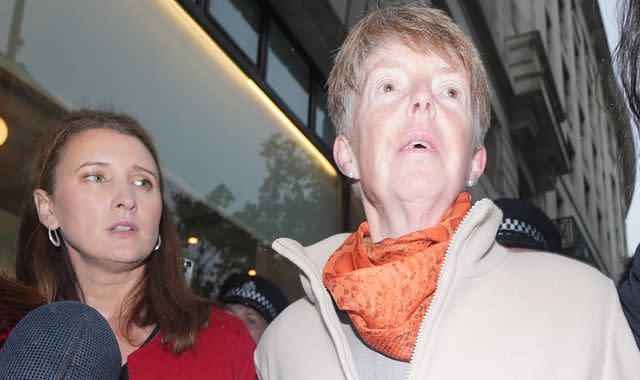Post Office Inquiry: Horrible day for former boss Paula Vennells

Paula Vennells arrived at the Post Office Inquiry a former chief executive, a former Church of England lay preacher and an ex-CBE, with only her reputation, and perhaps her liberty, left to defend.
After more than five hours of questioning she has done very little to restore the former, with the latter still very much a live issue.
While she was giving evidence her nemesis Alan Bates was meeting the Metropolitan Police to discuss their ongoing investigation.
Post Office inquiry: Paula Vennells's evidence as it happened
The day went horribly for Ms Vennells from the moment she stepped from her car in torrential rain and was met by the sort of media scrum reserved for superstars and the shamed.
Navigating hordes of cameras and reporters is the 21st century's version of the public stocks.
Having avoided scrutiny for nearly nine years, during which time the Post Office she ran has been revealed as deceitful, vindictive and shambolic, she should have expected nothing less.
Inside she faced an audience of around 150 sub-postmasters, the toughest of crowds for the person ultimately responsible for sending many of them to jail for crimes they didn't commit.
After a reminder from the inquiry chair Sir Wyn Williams about her right to avoid self-incrimination, her opening gambit was an apology.
She said sorry to the sub-postmasters and families whose lives had been ruined. She said sorry specifically to Mr Bates and Lord Arbuthnot, their parliamentary champion, and the investigators from Second Sight, who exposed the Post Office's failings on her behalf and she shut down for their trouble.
The respite lasted as long as it took Jason Beer KC to clear his throat. The lead counsel to the inquiry's principal weapon was irony and it was devastating, the more so for apparently being lost on Ms Vennells.
"Are you the unluckiest chief executive in history?" he asked.
After a pause, the first of many, she replied: "One of my reflections on all of this is that I was too trusting."
That captured her fundamental defence, which is that during 12 years at the Post Office, seven of them as chief executive, she was entirely unaware of the multiple issues that led to the biggest miscarriage of justice in British legal history.
After listing the multiple things she claims in her 775-page witness statement not to have known, from bugs in the Horizon computer system to instructions to shred documents, Mr Beer asked: "Was there a conspiracy, lasting 12 years, involving different people over time to deny you documents and falsely reassure?"
After careful consideration she concluded conspiracy might be going too far: "My deep sorrow is that individuals, myself included, made mistakes, didn't see things, didn't hear things."
Throughout the hearing she claimed not to have been aware of fundamental issues. For example, she said she did not know the Post Office could investigate and prosecute its staff, a power it has had since the 17th century, until she became chief executive.
When confronted with clear evidence she ought to have been aware of issues, in the form of emails and documents she admitted to sending and receiving, she claimed not to have understood their true meaning at the time.
Several times she was moved to tears. More frequently she was stunned into silence by questions, struggling to summon answers when trapped by the contradictions in her evidence.
The sub-postmasters, meanwhile, struggled to contain their disdain, hollow laughter greeting several answers.
There was no laughter when she was challenged about the suicide of sub-postmaster Martin Griffiths, and an email in which she appeared to attribute it to his mental health, rather than the actions of Post Office investigators who were pursuing him.
"Sorry is not an adequate word, I am just very sorry that Mr Griffiths is not here today," she said.
She has two more days in the witness stand, and on this evidence, nowhere to go.

 Yahoo News
Yahoo News 
